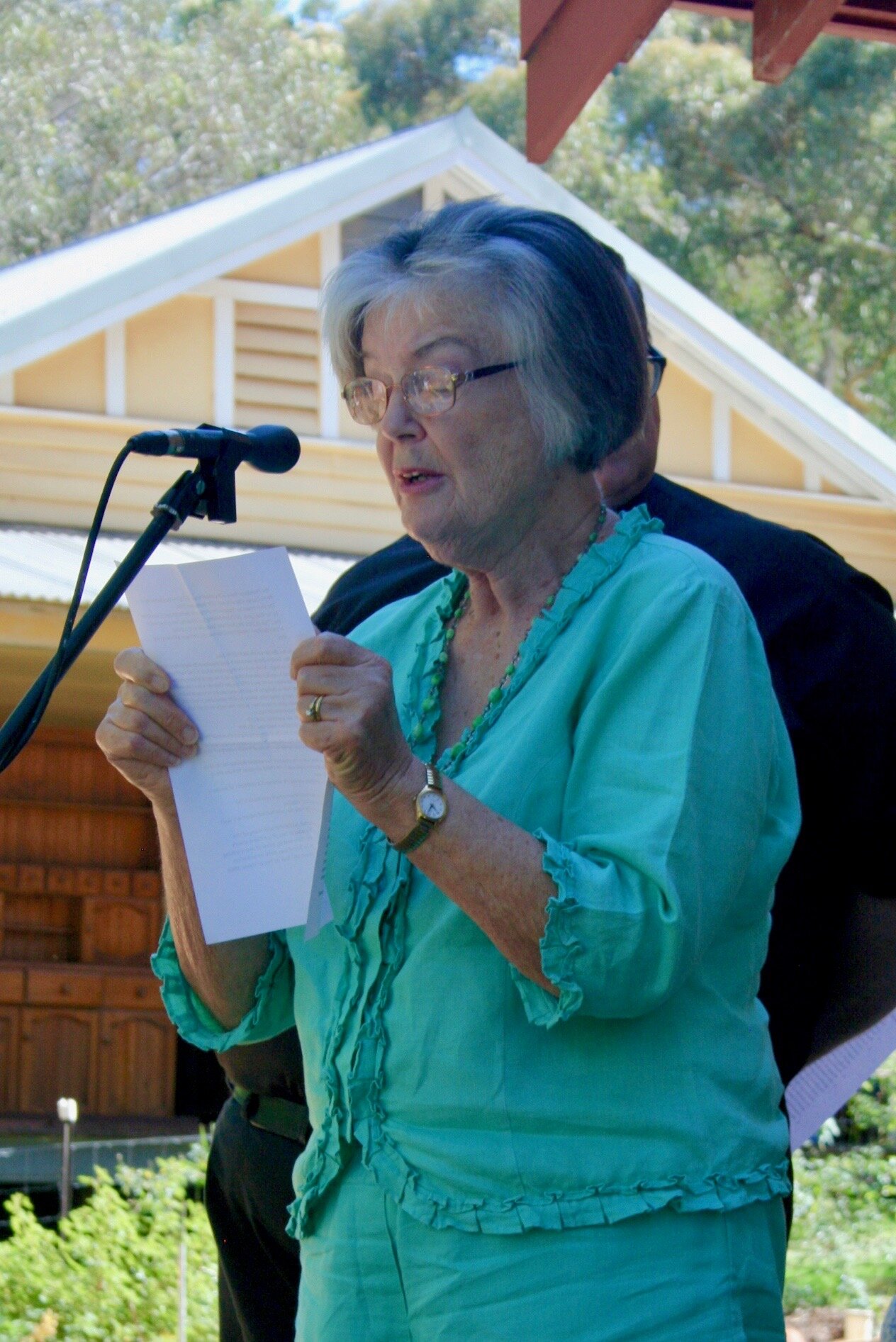On Sunday 21 March we welcomed Archbishop Kay Goldsworthy to lead us in prayer and worship as we blessed more than a decade’s worth of restoration and site works.
Two longstanding parishioners offered their reflections over brunch. Here they are for you to enjoy!
Sheena Wheeler
The Foundation Stone of St Cuthbert’s was laid by the then Archbishop of Perth Charles Riley on Sunday 13 September 1924.
The silver trowel (on display at the entrance to the Parish centre) was donated by the Riley family. The Church building was completed and consecrated on the 1st March 1925; The Church was dedicated to St Cuthbert.
In 1963 Geoff and I moved from Queensland to Darlington with two young sons.
The Rev. Quinlan was the Rector 1939-1964.
The Rev. Leonard Quinlan was a much loved character in Darlington from 1939 to 1964.He taught Divinity at the Darlington State School. In 1942 Geoff recalls, after school he would occasionally take some of his class to Midland and buy them an ice-cream. His car was a 1936 two door Chevrolet with a Dicky seat. On his way back to Darlington he said the motor was hot, he stopped his car outside the Darling Range Hotel. Whilst the motor cooled down he went in to the bar and had a glass or two of beer. He then returned to his car and with the children he returned to Darlington.
The Rev J. Bowyer was appointed 1964-1970
The Rev. Andrew Donald was appointed 1970-1979
He was an inspiration to the Church community as he gradually restored the interior of the Church. The lead lined stained glass windows were installed during his time. They were gifted by many church families in memory of past parishioners.
On the Gospel (left) side of the Church are four windows depicting the life of St Cuthbert on the Baptism (right side) of the Church are scenes from the life of Mary Mother of Jesus.
The windows in the Sanctuary are the only windows in St Cuthbert’s of modern mode. Installed
On the North wall near the Sanctuary where a Pulpit once stood is the Aumbrey for the Reserved Sacrament. Installed
Father Andrew Donald was a very reserved man, who bonded extremely well with the more mature members of the Church, he had a congenial relationship with many of the congregation which was heightened with a glass or two of the finest sherry from time to time. At this time of his tenure there was an influx of many young families with young children which at times he found was quite an irritation during the Church services. I am aware there are still four or five of these 1966 Mothers are present here today.
Trish
Maughan
Keith and I builrt our first home in Darlington in 1968. A four bedroom brick and tile home was $11,500, the block cost $2,300 and interest rates were up to 17% - and the real eastate agent told us that housing prices in Perth would never go higher!
We began attending St Cuthbert’s while Father Donald was the parish priest. He baptised both of our children.
The change to the ministry of David Russell was quite something for the parish from his visits on a motorbike, to making a point by kicking a football down the aisle. There was a family in the new rectory and under David’s ministry there was a much greater youth inclusion when the CEBS group led by David and many local dads was the largest in the state.
David was followed by Ron and Patricia Pearce. At this point a dedicated groups arranged for the ceiling to be fitted. This was a great relief to the cleaners as drifts of white gum blossom would cover the freshly cleaned deep red kneelers. Unfortunately, ill health caused Ron’s early retirement.
We were then blessed with the wonderful dual ministry of Tess and Bob Milne. Tess is an amazing speaker and her sermons were current and entertaining to the old as to the young. At the time our young granddaughter attended regularly with us. She once asked me ‘Where’s God?’. As I prepared a proper Granny answer she said ‘…oh there he is’ as Bob emerged from the church. In their ministry, Bob and Tess faced some of the greatest challenges for St Cuthbert’s from the pain, anger and grief at the closure of Good Shepherd Church to the drama of the building of the Meeting Room. Meetings were packed with ‘concerned citizens of our iconic church’ who had never darkened its door. Evidently Beaty Chape’s address of this was something to hear. On the Monday the bulldozers started, Bob was expecting another flurry of phone calls but all was silent. They had moved on to a new cause.
From there we moved to the ministry of the energetic and charming Marie-Lousie Collins. Her sermons were entertaining and insightful and her group studies provided much food for thought.
Now, some 50 years later, to the ministry of Father Chris. From the beginning, a charismatic and truly Christian leader whose sermons made us laugh and think and ponder into the next week. Chris’s advocacy and work for all those in any need – spiritual, judicial, practical – takes us to the roots of our faith - though, like a beloved child, he has occasionally given us cause for anxiety.
As cherished and beautiful as the buildings and gardens of St Cuthbert’s are, it is the decades of ministers, parishioners, children, occasions, happy and sad, our faith and witness in the wider community that is the heart of our church.
From Charles Dickens: ‘God Bless us, every one’












